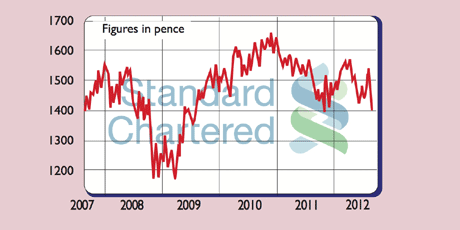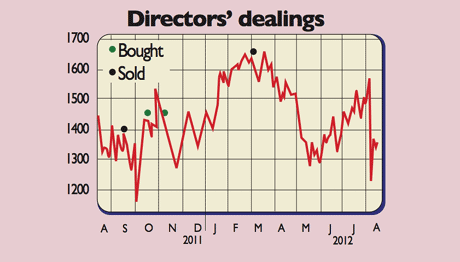Shares in focus: Has this boring bank got interesting?
Standard Chartered has been rocked by allegations of money laundering for Iran. So, is now the time to scoop up shares in the bank? Phil Oakley investigates.
Get the latest financial news, insights and expert analysis from our award-winning MoneyWeek team, to help you understand what really matters when it comes to your finances.
You are now subscribed
Your newsletter sign-up was successful
Want to add more newsletters?

Twice daily
MoneyWeek
Get the latest financial news, insights and expert analysis from our award-winning MoneyWeek team, to help you understand what really matters when it comes to your finances.

Four times a week
Look After My Bills
Sign up to our free money-saving newsletter, filled with the latest news and expert advice to help you find the best tips and deals for managing your bills. Start saving today!
Investors should steer clear of scandal-hit Standard Chartered, says Phil Oakley.
The business
Standard Chartered is currently in the news over allegations it laundered money for Iran. That aside, the bank offers typical banking services to retail customers, such as current accounts, loans, credit cards and mortgages. It also provides businesses with services such as loans, corporate finance, trade finance and investment banking. The company also has a private bank for wealthy customers. More than 90% of profits come from Asia, Africa and the Middle East.
The history
The bank was formed in 1969 from the merger of Standard Bank of South Africa and the Chartered Bank of India, Australia and China both date from the mid-19th century. Standard Bank began life in the Cape province of South Africa in 1862 and was a major financier of gold and diamond mines. Chartered Bank opened its first branch in Bombay (Mumbai) in 1858.
MoneyWeek
Subscribe to MoneyWeek today and get your first six magazine issues absolutely FREE

Sign up to Money Morning
Don't miss the latest investment and personal finances news, market analysis, plus money-saving tips with our free twice-daily newsletter
Don't miss the latest investment and personal finances news, market analysis, plus money-saving tips with our free twice-daily newsletter
The 1970s saw the newly merged bank build up a presence in Europe and the Americas while growing strong positions in Africa and Asia. In 1986 it was on the end of a hostile takeover bid from Lloyds Bank. This failed, but it forced Standard Chartered to change and it sold off much of its European and American businesses.
The last decade has seen Standard Chartered boost its presence in Asia by buying stakes in many banks. It has also benefited from the region's strong economic growth, with profits for shareholders more than doubling during the last five years.
Earlier this month the bank was accused by the New York State Department of Financial Services of hiding more than $250bn of illegal banking business with Iran between 2001 and 2010. Despite fears of a huge fine and the loss of its New York banking licence, it has agreed to pay $340m to settle the issue.
Other US authorities have ongoing investigations into the bank over the same issue.
The chief executive
Peter Sands has been chief executive since 2006, having previously been the company's finance director. Before joining Standard Chartered in 2002 he worked for McKinsey as a consultant. He is credited with being one of the key figures who put together the state bail-out of some British banks in 2008.
Only a couple of weeks ago, Sands lauded Standard Chartered for being a "boring" but successful bank. It looks anything but that now. He takes away a basic salary of just over £1m.
Should you buy the shares?
In financial services, reputation is everything. Lose a good name and it can be tough to get it back. So investors in Standard Chartered will be glad that the regulator has settled, and hopeful that the Iranian issue will now blow over quickly. But with the share price up nearly a quarter since the initial dip on the original allegations breaking, it seems a lot of easy money has already been made. So is this the right time to jump on board?
Scandal aside, the bank has a lot going for it. Its profits are still growing nicely and it makes good returns for shareholders from its Asian business in particular, without taking lots of risk. Compared with its embattled British peers, its finances are impeccable, with loans comfortably funded from customer deposits.
But the shares don't look cheap, priced at 20% more than book value. Then there's the toughening economic outlook for Asia to consider as China struggles to maintain its herculean growth rates.
The specific trouble with banks is that it's very difficult to know what you are buying. A sudden downturn in business conditions can trigger bad loans that were unthinkable just a few months earlier. The company's dividend yield looks quite interesting, but we'd like to see the shares a lot lower than they are now before we'd even think about buying them. Avoid for now.
The numbers

Stockmarket code: STAN
Share price: 1,345p
Market cap: £32.1bn
Net assets (June 2012): $42.3bn
Assets/equity (June 2012): 14.8 times
P/bv (June 2012): 1.2 times
P/e (current year estimate): 9.8 times
Yield (prospective)4.0%
What the analysts say
Buy: 16
Hold: 16
Sell: 4
Average price target: 1,582p
Directors' shareholdings

P Sands: 213,852
R Meddings: 120,000
J Bindra: 165,994
Get the latest financial news, insights and expert analysis from our award-winning MoneyWeek team, to help you understand what really matters when it comes to your finances.
Phil spent 13 years as an investment analyst for both stockbroking and fund management companies.
-
 Should you buy an active ETF?
Should you buy an active ETF?ETFs are often mischaracterised as passive products, but they can be a convenient way to add active management to your portfolio
-
 Power up your pension before 5 April – easy ways to save before the tax year end
Power up your pension before 5 April – easy ways to save before the tax year endWith the end of the tax year looming, pension savers currently have a window to review and maximise what’s going into their retirement funds – we look at how